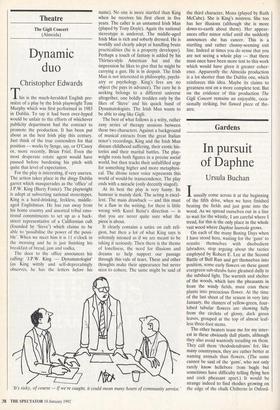Theatre
The Gigli Concert (Almeida)
Dynamic duo
Christopher Edwards
This is the much-heralded English pre- miere of a play by the Irish playwright Tom Murphy which was first performed in 1983 in Dublin. To say it had been over-hyped would be unfair to the efforts of whichever publicity department had the contract to promote the production. It has been put about as the best Irish play this century. Just think of the true contenders for that position — works by Synge, say, or O'Casey or, more recently, Brian Friel. Even the most desperate estate agent would have paused before burdening his pitch with quite that level of expectation.
For the play is interesting, if very uneven. The action takes place in the dingy Dublin garret which masquerades as the 'office' of J.P.W. King (Barry Foster). The playwright is adept at subverting national stereotypes. King is a hard-drinking, feckless, middle- aged Englishman. He has run away from his home country and assorted tribal emo- tional commitments to set up as a back- street representative of a Californian cult (founded by 'Steve') which claims to be able to `possibilise the power of the possi- ble'. When we meet him it is 11 o'clock in the morning and he is just finishing his breakfast of bread, jam and vodka.
The door to the office announces his calling: `J.P.W. King — Dynamatologist' (as King wittily and self-deprecatingly observes, he has the letters before his
name). No one is more startled than King when he receives his first client in five years. The caller is an unnamed Irish Man (played by Tony Doyle). Again the national stereotype is undercut. The middle-aged Irish Man is rich and soberly dressed. He is worldly and clearly adept at handling brute practicalities (he is a property developer). Perhaps a touch of fantasy is added by his Thirties-style American hat and the impression he likes to give that he might be carrying a gun. He is in despair. The Irish Man is not interested in philosophy, psychi- atry or psychology. King's fees are no object (he pays in advance). The cure he is seeking belongs to a different universe altogether, one boldly trodden only by the likes of 'Steve' and his quack band of Dynamatologists. The Irish Man wants to be able to sing like Gigli.
The best of what follows is a witty, rather zany series of therapy sessions between these two characters. Against a background of musical extracts from the great Italian tenor's recordings, King and the Irish Man discuss childhood suffering, their erotic his- tories and their marital battles. The play- wright roots both figures in a precise social world, but then tracks their unfulfilled urge for something higher and more metaphysi- cal. The divine tenor voice represents this world of would-be transcendence. The play ends with a miracle (only decently staged).
At its best the play is very funny. Its humour is mainly dark. The acting is excel- lent. The main drawback — and this must be a flaw in the writing, for there is little wrong with Karel Reisz's direction — is that you are never quite sure what the piece is about.
It clearly contains a satire on cult reli- gion, but then a lot of what King says is solemnly intoned as if we are meant to be taking it seriously. Then there is the theme of loneliness, the need for illusions and dreams to help support our passage through this vale of tears. These and other thoughts make their appearance but never seen to cohere. The same might be said of 'It's risky, of course — if were caught, it could mean many hours of community service.' the third character, Mona (played by Ruth McCabe). She is King's mistress. She too has her illusions (although she is more down-to-earth about them). Her appear- ances offer minor relief until she suddenly announces she has cancer. This is a startling and rather clumsy-seeming exit line. Indeed at times you do sense that you are not seeing a whole play — that there must once have been more text to this work which would have given it greater coher- ence. Apparently the Almeida production is a lot shorter than the Dublin one, which reinforces this idea. Maybe its claims to greatness rest on a more complete text. But on the evidence of this production The Gigli Concert remains an enjoyable, occa- sionally striking, but flawed piece of the- atre.


















































 Previous page
Previous page